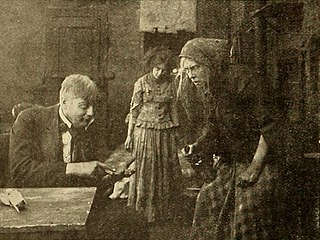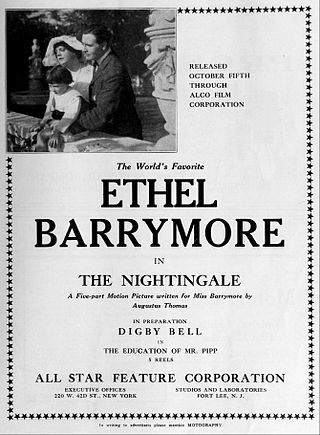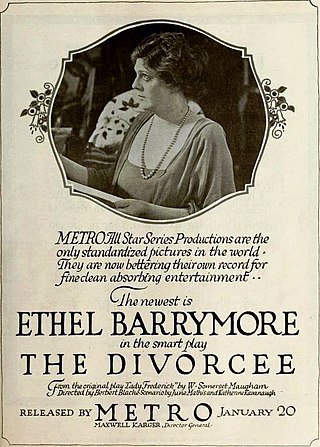
Ethel Barrymore was an American actress and a member of the Barrymore family of actors. Barrymore was a stage, screen and radio actress whose career spanned six decades, and was regarded as "The First Lady of the American Theatre". She received four nominations for the Academy Award for Best Supporting Actress, winning for None but the Lonely Heart (1944).

The Awakening of Helena Richie is a novel by the American writer Margaret Deland set in the 19th century fictional locale of Old Chester, a Western Pennsylvania rural village just a few miles outside the city of Pittsburgh, then an industrial boomtown.

The Witness for the Defense is a 1919 American silent drama film directed by George Fitzmaurice and starring Elsie Ferguson, Warner Oland, and Wyndham Standing.
The Enchanted Cottage is a 1924 American silent drama film directed by John S. Robertson based upon a 1923 play by Arthur Wing Pinero.

Déclassée, listed as Déclassé on some posters, is a 1925 American silent drama film of manners produced and released by First National Pictures in association with Corinne Griffith as executive producer. Griffith also stars in the production which was directed by Robert G. Vignola and based on the 1919 play by Zoë Akins that starred Ethel Barrymore.

Raymond Hackett was an American stage and screen actor. He had been a child actor on the Broadway stage and was the brother of Albert Hackett. He was born in New York City the son of Maurice Hackett and Florence Hackett. His mother was later a silent screen actress. Hackett's first wife was Myra Hampton, the marriage was dissolved. His second wife was the actress Blanche Sweet.

The Actress is a lost 1928 American silent drama film produced and distributed by Metro-Goldwyn-Mayer. The film was directed by Sidney Franklin, and starred Norma Shearer.
Classmates is a 1914 silent film directed by James Kirkwood for the Biograph Company. It is based on the 1907 stage play Classmates by Margaret Turnbull and William C. deMille. It was shot in Jacksonville, Florida at the end of 1913.

Wildfire is a 1925 American silent drama film directed by T. Hayes Hunter. It was produced by Distinctive Productions, a company founded by George Arliss, and distributed by the Vitagraph Company of America. The film stars Aileen Pringle.

Here Comes the Bride is a lost 1919 American silent comedy film produced by Famous Players–Lasky and released by Paramount Pictures. This film is based on the 1917 Broadway play Here Comes the Bride by Max Marcin and Roy Atwell. The film was directed by John S. Robertson and stars John Barrymore.

On the Quiet is a lost 1918 American silent comedy film produced by Famous Players–Lasky and released by Paramount Pictures. It was directed by Chester Withey and starred John Barrymore. The film, based on an original 1901 play, was written by Augustus Thomas and served as a popular hit for William Collier, Sr.

The Tree of Knowledge is a lost 1920 American silent drama film produced by Famous Players–Lasky and distributed by Paramount Pictures. It was directed by William C. deMille and starred Robert Warwick. It is based on an 1897 play, The Tree of Knowledge, by R. C. Carton.

Under the Gaslight is a 1914 American silent melodrama film produced by the Biograph Company, for theatrical impresarios Klaw & Erlanger, and distributed by The General Film Company. It is based on the old Victorian stage melodrama of the same name by Augustin Daly popular in the 1860s and 1870s and revived periodically for years afterwards. This film was directed by Lawrence Marston and stars Lionel Barrymore.

The Nightingale, drama film directed and written by Augustus Thomas in 1914, is a silent drama film, which Alco Film Corporation released. Ethel Barrymore makes her acting debut in this feature film, which Thomas wrote specifically for her. Thomas, famed as a Broadway playwright, was the best friend of Barrymore's father Maurice and had known the actress since she was a child. As with many of Barrymore's films to come, the advertising for this film says the film is told in 'acts' as with a stage play, an effort to remind the audience of the star's status and preference for the legitimate stage. This film was long thought to be lost.

Our Mrs. McChesney is a lost 1918 American silent comedy-drama film produced and distributed by Metro Pictures, directed by Ralph Ince, and based on the 1915 play by Edna Ferber and George V. Hobart which starred Ethel Barrymore.

The Divorcee is a 1919 American society drama starring Ethel Barrymore in her last silent feature film. The film is based on a 1907 play, Lady Frederick by young Somerset Maugham, which had starred Barrymore on Broadway. The play was already quite dated when this film was made, but the actress was always comfortable with this kind of soap-operish melodramatic material. Herbert Blaché directed, and June Mathis wrote the scenario based on Maugham's play. The film was produced and distributed by the Metro Pictures company.
The Return of Peter Grimm is a 1935 American drama film directed George Nicholls, Jr. from a screenplay by Francis Edward Faragoh based upon the 1911 Broadway play of the same name by David Belasco. Produced by Kenneth Macgowan and released by RKO Radio Pictures on September 13, 1935, it stars Lionel Barrymore, Helen Mack, Edward Ellis, and Donald Meek.

Ethel Barrymore was an American actress of stage, screen and radio. She came from a family of actors; she was the middle child of Maurice Barrymore and Georgie Drew Barrymore, and had two brothers, Lionel and John. Reluctant to pursue her parents' career, the loss of financial support following the death of Louisa Lane Drew, caused Barrymore to give up her dream of becoming a concert pianist and instead earn a living on the stage. Barrymore's first Broadway role, alongside her uncle John Drew, Jr., was in The Imprudent Young Couple (1895). She soon found success, particularly after an invitation from William Gillette to appear on stage in his 1897 London production of Secret Service. Barrymore was soon popular with English society, and she had a number of romantic suitors, including Laurence Irving, the dramatist. His father, Henry Irving, cast her in The Bells (1897) and Peter the Great (1898).

The Call of Her People is a 1917 silent film spectacle directed by John W. Noble and starring Ethel Barrymore. It was produced and distributed by Metro Pictures. The story is based on a play by Edward Sheldon.

An American Widow is a 1917 silent comedy film directed by Frank Reicher and starring Ethel Barrymore. It is based on a 1909 play by Kellett Chambers. Metro Pictures produced and distributed.


















